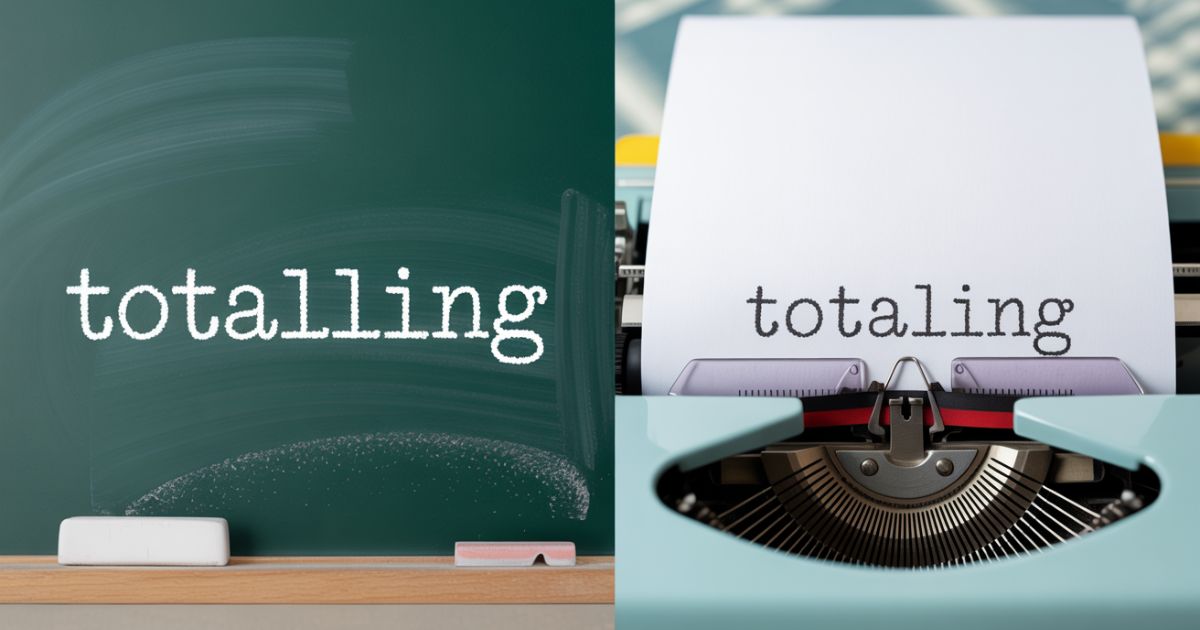English is a beautifully complex language, full of words that look similar but can vary based on geography, usage, and spelling conventions. One of the most common questions that arises among writers, students, and professionals alike is: Should I write “totalling” or “totaling”?
If you’ve ever second-guessed yourself while typing a report, crafting an email, or filling out a form, you’re not alone. The confusion between “totalling” and “totaling” is just one of many examples of how British and American English differ in subtle but important ways.
In this article, we’ll break down the differences between the two spellings, offer scenario-based examples to help you remember which to use, and give you practical advice to ensure you’re always using the correct form for your audience.\
What’s the Difference Between “Totalling” and “Totaling”?
Both “totalling” and “totaling” are present participles of the verb to total, which means to calculate the total amount of something. The only difference lies in the spelling convention—specifically, whether you are using British English or American English.
- Totalling is the correct spelling in British English.
- Totaling is the correct spelling in American English.
So, it’s not a matter of one being right and the other wrong. Both are correct—depending on where your audience is located or the variety of English you’re following.
Why Is There a Spelling Difference?
The root of the confusion stems from how words ending in a vowel + consonant behave when adding suffixes like -ing or -ed. In British English, when a word ends in a single vowel followed by a consonant, and the stress is on the final syllable, the final consonant is often doubled before adding a suffix.
For example:
- Travel → Travelling (British) / Traveling (American)
- Cancel → Cancelling (British) / Canceling (American)
- Total → Totalling (British) / Totaling (American)
In contrast, American English tends to avoid doubling the final consonant unless the stress falls on the final syllable (e.g., begin → beginning).
Scenario Examples to Illustrate the Difference
To help this distinction sink in, let’s look at a few real-world examples:
H3: Scenario 1: Business Report Writing (UK vs. US)
UK version:
“After totalling all the expenses for Q2, we found that our budget had been exceeded by 12%.”
US version:
“After totaling all the expenses for Q2, we found that our budget had been exceeded by 12%.”
Key Takeaway: If you’re writing for a British or Commonwealth audience (e.g., UK, Australia, New Zealand), go with “totalling”. If your audience is primarily American, use “totaling”.
H3: Scenario 2: Academic Essay or Thesis
If you’re submitting work to a university in Canada, India, or any Commonwealth country, use British spelling:
“The data collected from the surveys, totalling over 500 responses, was analyzed using qualitative methods.”
If you’re submitting your thesis to an American institution:
“The data collected from the surveys, totaling over 500 responses, was analyzed using qualitative methods.”
Pro Tip: Check the style guide you’re required to follow (APA, MLA, Chicago, etc.)—they often specify whether to use British or American English.
H3: Scenario 3: Casual Writing or Blogging
In informal settings, consistency still matters. Imagine you’re writing a travel blog:
UK-style blog:
“After totalling up the miles we’d walked in Paris, we realized we had covered more ground than we ever had back home.”
US-style blog:
“After totaling up the miles we’d walked in Paris, we realized we had covered more ground than we ever had back home.”
Even in blogs or casual content, being consistent in your spelling conventions gives your writing a more polished and professional feel.
What About Spell Check and Auto-Correct?
Most modern tools like Microsoft Word, Google Docs, and Grammarly will flag “totalling” or “totaling” based on the language setting of your document.
- If your document is set to UK English, it will suggest “totalling.”
- If it’s set to US English, it will prefer “totaling.”
To avoid confusion, make sure your language settings match the spelling style you intend to use. This applies not only to spelling but also punctuation (like single vs. double quotation marks) and vocabulary (e.g., “colour” vs. “color”).
Which One Should You Use?
Here’s a simple guide:
| Audience | Preferred Spelling |
|---|---|
| United States | Totaling |
| United Kingdom | Totalling |
| Canada | Totalling (mostly British English) |
| Australia | Totalling |
| International Business | Depends on the company’s preferred style |
| Academic Writing | Follow the institution’s style guide |
If you’re unsure, it’s always safe to:
- Check your audience: Are you writing for a British, American, or international audience?
- Match your style guide: Especially important for academic or professional writing.
- Be consistent: Don’t switch between “totalling” and “totaling” in the same document.
Other Words That Follow the Same Rule
This isn’t just about one word. Many others follow the same British vs. American spelling convention:
- Labeling (US) / Labelling (UK)
- Modeling (US) / Modelling (UK)
- Traveling (US) / Travelling (UK)
- Fueling (US) / Fuelling (UK)
If you learn the pattern once, you’ll be better prepared for similar word pairs in the future.
Final Thoughts
At first glance, “totalling” vs. “totaling” may seem like a minor issue, but in a world where clear communication and professionalism matter, getting these details right can set your writing apart.
The main thing to remember is that both are correct, but context and consistency are key. Whether you’re writing a business report, an academic essay, or a blog post, using the correct form of the word helps you appear more credible and competent to your audience.


